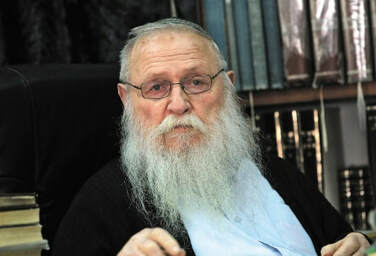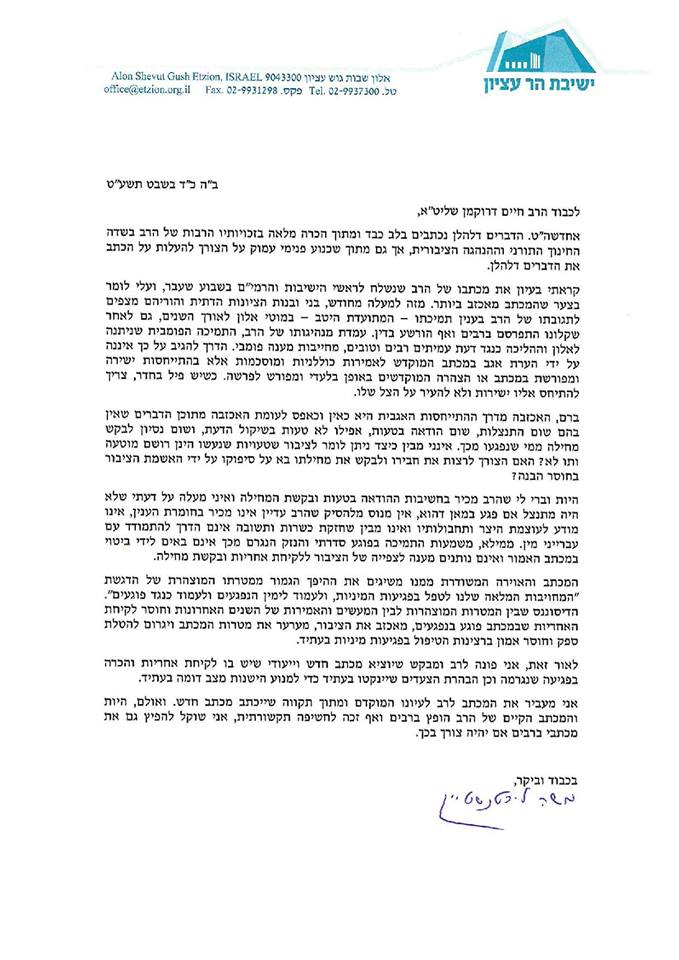 (Rabbi) Chaim Druckman
(Rabbi) Chaim Druckman Letter from Head of Yeshiva Rav Mosheh Lichtenstein shlita to Rabbi Chaim Druckman shlita
Dear Rabbi Chaim Druckman shlita,
Wishing you well, all the best. The following is written with a heavy heart and full recognition of the rabbi's many accomplishments in the field of Torah education and public leadership, but also out of deep internal conviction that the following should be put in writing.
I read carefully the rabbi's letter sent to the heads of the yeshivot and the teachers last week, and I must say with regret that the letter is very disappointing. For more than a month, the sons and daughters of Religious Zionism and their parents have been waiting for the rabbi's response to his well-documented support of Moti Alon over the years, even after his disgrace was publicised and even convicted. The position of the rabbi's leadership, the public support given to Alon, and the conduct against the opinions of many good colleagues, require a public response. The way to respond to this is not by a casual remark in a letter dedicated to broad and agreed statements, but rather in a direct and explicit reference in a letter or statement devoted exclusively and explicitly to the case. When there is an elephant in the room, you have to relate to it directly and not to comment on its shadow.
However, the disappointment with the casual way of dealing with this matter is nothing compared to the disappointment in the content of the words that have no apology, no admission of error, even no error of judgment, and no attempt to ask forgiveness from those who were harmed. I do not understand how it is possible to tell the public that mistakes made are merely a mistaken impression? Did the need to appease his friend [Elon] and ask his forgiveness be satisfied by blaming the public for lack of understanding?
Since it is clear to me that the Rabbi recognises the importance of acknowledging the mistake and the seeking of forgiveness and I do not consider that he would not apologise for hurting anyone, There is no escaping the conclusion that the Rabbi still does not recognise the gravity of the matter, is unaware of the power of his instinct and his subterfuge, and does not understand that kashrut and repentance are not the way to deal with sex offenders. In any event, the significance of support for a serial offender and the damage caused by it are not reflected in the said letter and do not provide a response to the public's view of taking responsibility and seeking forgiveness.
The letter and atmosphere broadcast from it achieve the exact opposite of its declared goal of emphasising "our full commitment to address the sexual assaults, stand to the right of the victims and stand up against the perpetrators." The dissonance between the declared goals and the acts and statements of recent years and the lack of responsibility in the letter harms the victims, disappoints the public, undermines the goals of the letter and will cause doubts and mistrust in the seriousness in which future sexual abuse will be dealt with.
In light of this, I turn to the Rabbi and ask him to issue a new and dedicated letter that takes responsibility and recognition of the damage caused and clarifies the steps that will be taken in the future in order to prevent a similar situation in the future.
I pass the letter to the Rabbi for his preliminary study and in the hope that a new letter will be written. However, since the Rabbi's existing letter has been disseminated widely and has even received media exposure, I am considering publishing my letter in public if necessary.
Respectfully and dearly,
Mosheh Lichtenstein

 RSS Feed
RSS Feed